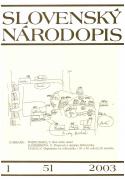BOH ALEBO SATAN? Úloha nového náboženského hnutia Slovo života v polarizácii rómskej kolónie v Plaveckom Štvrtku
God or devil? The role of a new Christian religious movement-The word of life-in the religious polarisation in the Romany colony at Plavecký Štvrtok
Author(s): Tatiana Zachar PodolinskáSubject(s): Anthropology
Published by: SAV - Slovenská akadémia vied - Ústav etnológie a sociálnej antropológie Slovenskej akadémie vied
Keywords: Roma; faith; misionary strategies; a new Christian religious movement - the Word of Life
Summary/Abstract: The study aims to map the activities of a new Christian religious movement - the Word of Life - among the Roma at Plavecký Štvrtok in Záhorie. The first wave of Whitsun preachers reached Slovakia shortly after the Velvet Revolution in 1989. One of the most characteristic features of this congregation is the engagement in work with the Roma. These concerns may be demonstrated by following examples: East Slovakia has been greatly influenced by Ján Vihonský, Romany preacher of the Word of Life, who heads several Romany missionary groups at Sobrance, Blatné Remety, Michalovce and Iňačovce. He is also active in establishing further congregations at Humenné, Bunkovce and Pavlovce nad Uhom. In the West Slovakia the Word of Life operates among the Roma at Plavecký Štvrtok and is represented there by Milan Juríček from Modra. Due to his missionary work biblical schools - each of them led by a local Romany pastor - have already been founded at Galanta and Sládkovičovo. Considerable activity has been developed there among the so-called olašskí (well-to-do) Roma. The author first concentrates on the history of the Word of Life's activities among the Roma at Plavecký Štvrtok and then on mapping the activities of the congregation here. She uses sociological techniques when attempting to give an account of the situation inside the local Romany colony. It appears to be non-standard as the local Roma are split into two hostile groups; the division line is marked by high solid fences (denoted by them as the fences of war) and is running through the central part of the colony. Searching for causes of the differentiation and concequent religious polarisation, the author recorded reactions of both groups to the missionaries of the Word of Life. She followed her case by letting the Roma from both camps speak freely and express their own personal attitudes; she also alloted space to the views of the converted Roma. The study is concluded by a survey of reasons given by the "re-born" Roma for becoming converts. The most frequently repeated ones are: feeling of personal God and of God for everyone, i.e. also for the Roma. The missionary strategy of the Word of Life is appealing to them because their God is also for the poor, ignorant, uneducated and despiced by others. He is a living being who will directly communicate with his worshippers, possibly make fun of them, and be both strict and kind. Personal contacts with God established through songs and songs glorifying Him have become an opportunity for them to express their own feelings by means of song, movement and dance. Emphasis is laid on the role played by every single worshipper boosts self-esteem of each member of the congregation. Also, close contact between the preacher and that small group of worshippers is highly effective and appreciated as individual. Therefore, the Word of Life profoundly differs from the religion of the majority population in the area.
Journal: Slovenský národopis
- Issue Year: 51/2003
- Issue No: 1
- Page Range: 4-31
- Page Count: 28
- Language: Slovak

